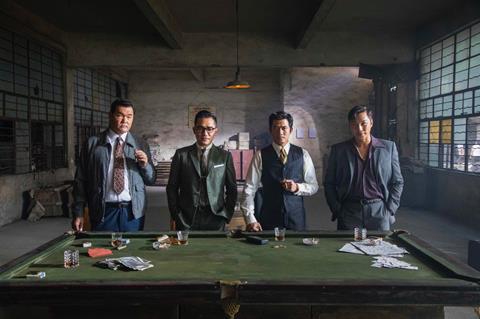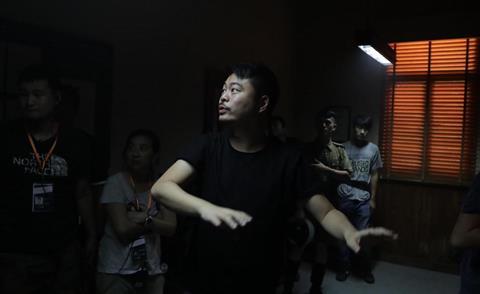
Hong Kong director Philip Yung’s latest film, Where The Wind Blows, is a 1960s-set period drama that features two of Asia’s biggest stars, Tony Leung Chiu-wai and Aaron Kwok, playing two real-life notoriously corrupt and merciless cops.
Previously known as Theory Of Ambitions, the $38m film had tentatively been aiming for a pan-Asian rollout either in late 2019 or early 2020, before cinema closures ruled out that possibility. It has now been selected as one of two opening films at the Hong Kong International Film Festival (HKIFF, April 1-12), albeit pending final confirmation. Dadi Century, Mei Ah Film Production and Bona Film Group are among the main investors.
Yung’s interest in the topic was sparked by his grandmother who used to feed him stories about old Hong Kong, providing much inspiration for his creativity later on. But this story was not immediately on the cards after the success of his third feature, Port Of Call, which earned accolades at various awards and festivals after premiering as HKIFF’s closing film in 2015.
In fact, Yung was prepping a project entitled The Sea, based on the true events of a Chinese fishing boat massacre, in China’s Guangxi province, until it ran into censorship issues in 2016. “My producer Julia Chu was anxious for me to get a large-scale project when people still had faith in me right after Port Of Call,” Yung recalls. “Then I mentioned this story, which was just an idea at that time, and the script wasn’t ready when we started talking to the actors.”
The first actor to sign up for the project was Kwok, who had just been named best actor at the Hong Kong Film Awards for his role in Port Of Call, playing a scruffy police officer determined to solve a murder mystery. Stronger persuasion was needed to convince Leung. Yung flew to Shanghai to meet him, but it took two months before the actor agreed to push back his long-planned vacation for Yung’s project.
“Tony is like a new friend. He told me a lot about himself, like his relationship with his father and his thoughts on acting. I felt inspired and included some of his personality traits into his character,” Yung says. He subsequently spent about six months completing the script with his writing team.
The characters that Leung and Kwok play are based on two high-ranking Hong Kong police officers-turned-fugitives, Nam Kong and Lui Lok. Both of them have often been portrayed in films such as To Be Number One and Lee Rock, mostly produced in the 1990s, and more recently in Wong Jing and Jason Kwan’s Chasing The Dragon in 2017.

“I like these films, made in the 1990s, but set in the 1960s when police corruption was rampant and illicit business was commonplace, but still they contained a lot of worldly wisdom. While watching these films then, I used to imagine how they would turn out if directed by me? You can say my dream for becoming a filmmaker started young,” says Yung, who started out working as a film critic before making his feature debut with Glamorous Youth in 2009 and May We Chat in 2013.
Two decades after imagining himself how he would have directed them, Yung feels blessed to have the opportunity to put these stories on screen – and do them differently. He explains the previous title, Theory Of Ambitions, was just a working title: “Later during production, the film turned out quite gentle, like a breeze blowing through lightly.” Hence the new English title, Where The Wind Blows.
Yung cut a three-minute teaser for Filmart a couple of years ago and showed it to veteran director Wong Jing. “His comment was ‘it seems too arty’. Perhaps he was trying to say our treatments were very different although my film features similar characters as his,” Yung says.
It was a challenge for the various departments from cinematography and set design to wardrobe and make-up to recreate old Hong Kong. The production was shot for 88 days over three months from November 2017, mostly in China’s Guangdong province, in cities such as Foshan and Kaiping, and with a couple of locations in Hong Kong, including the colonial-style Legislative Council building and an old-school Shanghainese-style barber shop in North Point, which has since closed down.
“We shot quite a lot of footages, which was quite unusual for me, to make sure we had enough coverage for the edit,” Yung recalls. “Our DoP was Warrior Of The Rainbow: Seediq Bale’s Chin Ting-Chang. I didn’t get Christopher Doyle [who worked on Port Of Call] this time because he would for sure throw tantrums on this shoot, as his style is more spontaneous and he prefers familiar modern settings. I’ll work with him again next time,” Yung quips.

























No comments yet